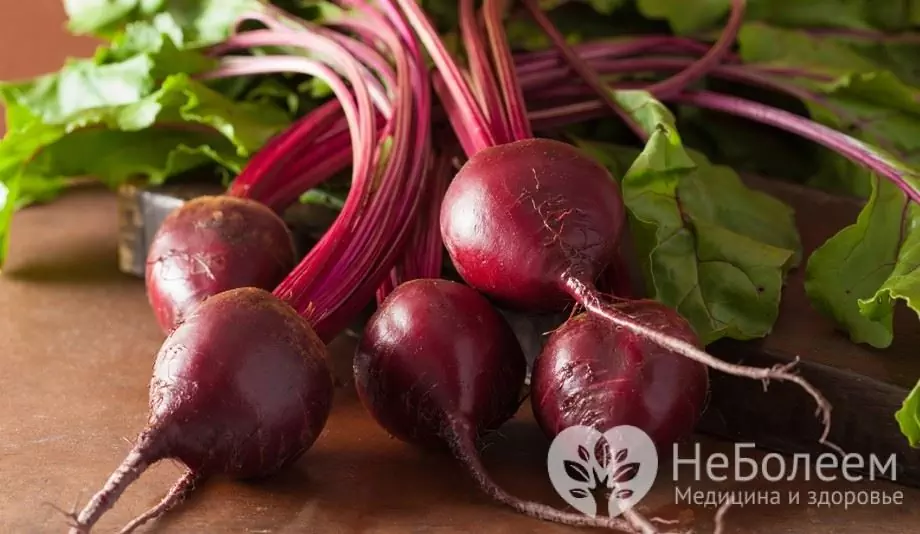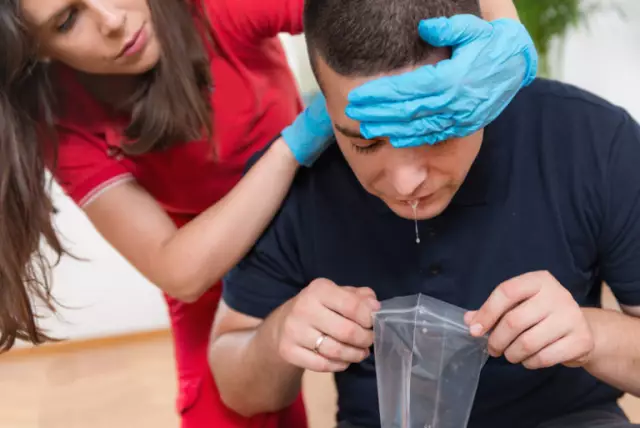- Author Rachel Wainwright wainwright@abchealthonline.com.
- Public 2023-12-15 07:39.
- Last modified 2025-11-02 20:14.
Beet poisoning
Beets are widely used not only in cooking, but also in folk medicine. Beets contain large quantities of minerals, vitamins, organic acids, which explains its benefits for the body. But if a poor-quality root vegetable is eaten, this can cause poisoning.

Source: depositphotos.com
How does beet poisoning happen?
To increase the yield of beets, unscrupulous farmers add an excessive amount of nitrates (nitrogen-containing fertilizers) to the soil, which then accumulate in root crops. Eating them can lead to nitrate poisoning.
During the ripening of the crop, its collection, transportation and storage, special bacteria of the denitrifying class get to the surface, and if it is damaged and into the thickness of the root crops. If the beets are not cooled quickly after boiling, these bacteria begin to convert nitrates (nitric acid salts) into nitrites (nitrous acid salts), which are many times more toxic. In addition, nitrates in the body are converted to nitrites and independently, as a result of metabolic processes.
Nitrites from the gastrointestinal tract enter the bloodstream and convert the iron contained in hemoglobin from bivalent to trivalent to form methemoglobin. This form is unable to transport oxygen, as a result of the body tissues, and primarily the nervous tissue, suffer from hypoxia.
Nitrite in high concentration can cause paresis of the vasomotor center, as well as dilation of blood vessels due to direct action on their muscle walls.
Poisoning symptoms
For acute poisoning with beets with a high content of nitrogenous compounds, the following are characteristic:
- nausea and vomiting;
- headache;
- severe dizziness;
- noise in ears;
- pain in the epigastric region;
- hands are felt as strangers, that is, their movements are impeded (symptom of “strangers' hands”);
- a feeling of tightness in the chest, not allowing you to breathe deeply;
- redness of the face, later replaced by cyanosis;
- transient visual disturbances;
- pain in the heart, palpitations (tachycardia);
- drop in blood pressure;
- loss of consciousness.

Source: depositphotos.com
Acute beet poisoning can occur only if a large number of root crops with a high nitrate content are eaten, so they are quite rare in practice. Chronic beet poisoning is diagnosed much more often. Long-term consumption of vegetables with low (but still exceeding the maximum permissible) concentration of nitrates leads to them.
Symptoms of chronic beet poisoning:
- increased weakness, fatigue;
- decrease in physical and mental capacity for work;
- sleep disorders;
- numbness of the fingers;
- pulling pains in the joints and muscles of the limbs;
- dry skin, often accompanied by cracks;
- skin rashes;
- brittle nails.
First aid for beet poisoning
When the first symptoms of poisoning appear, the victim needs to rinse the stomach. To do this, you should drink a few glasses of warm water, then, irritating the root of the tongue, induce vomiting. The procedure is performed several times until the appearance of clean wash water in order to remove the maximum possible amount of poison from the body.
To prevent further absorption of toxins that have managed to penetrate into the small intestine, it is necessary to take an absorbent (Filtrum STI, Activated carbon, Smecta or any other).
When is medical attention needed?
For mild beet poisoning, first aid is usually sufficient to bring about significant improvement. In this case, there is no need to contact specialists. If, despite the measures taken, the symptoms of intoxication increase, an ambulance should be called or the victim should be taken to the hospital on his own. It is necessary to immediately seek medical help in case of poisoning of a pregnant woman, an elderly person or a child in the first years of life.
Treatment begins with oxygen therapy. To restore the ability of hemoglobin molecules to carry oxygen, a solution of methylene blue (antidote to nitrites), a hypertonic glucose solution is injected intravenously. In order to improve metabolic processes in organs and tissues, vitamin therapy is indicated.
Prevention
To prevent beetroot poisoning when eating it, you must follow the rules:
- before cooking, wash and clean the vegetable thoroughly;
- when cooking, it is advisable to place the beets in boiling water and cook for at least 45 minutes;
- after the end of cooking, cool the root vegetables as quickly as possible;
- do not store cooked beets for a long time.

Elena Minkina Doctor anesthesiologist-resuscitator About the author
Education: graduated from the Tashkent State Medical Institute, specializing in general medicine in 1991. Repeatedly passed refresher courses.
Work experience: anesthesiologist-resuscitator of the city maternity complex, resuscitator of the hemodialysis department.
The information is generalized and provided for informational purposes only. At the first sign of illness, see your doctor. Self-medication is hazardous to health!






